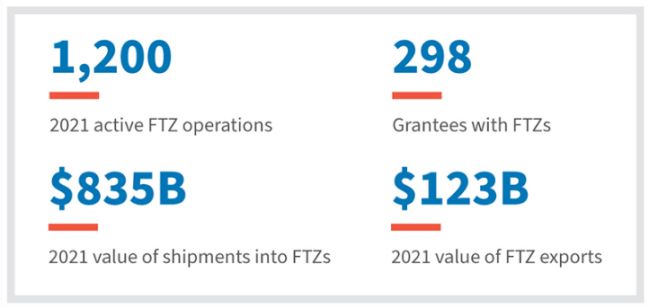Duty costs for importations have traditionally been viewed as an unavoidable cost of doing business in today's global market. Procurement departments rarely address tariffs proactively, conceding to either pay such costs directly or as an embedded expense in more complex supply chains and transaction structures. Intensified by geopolitical tensions and supply chain disruptions, punitive tariffs and other international customs costs have risen to unprecedented levels. As a result, companies should be exploring all available tools to help alleviate the costs of international sourcing. In the U.S., one of these tools is the Foreign Trade Zone (FTZ) program.
Due to the perception of FTZs being complex, pursuing the strategy is often seen as a daunting task with importers intimidated by the multifaceted regulatory framework, reporting responsibilities, and operational changes to their business. Even for companies already taking advantage of FTZ savings benefits, those strategies are not always fully optimized.
Furthermore, the day-to-day responsibilities of managing a zone, navigating system changes, and periodic reporting requirements can limit a company's ability to think strategically or proactively about the program to identify untapped potential.
Despite the overall growth in the FTZ program, marketing its economic benefits and efficiently leveraging the FTZ as an economic development tool is a challenge for some grantees. Certain regions have seen an explosion of increased FTZ usage, while other regions have not had an FTZ Operator in years.

How FTI Consulting Can Help
For companies not yet operating in FTZs:
FTI Consulting's international trade and customs professionals provide practical guidance on all aspects of the FTZ program. We help companies new to the idea evaluate the strategy holistically – not only for one location or business unit, but through an analysis of the entire international supply chain (including embedded duty and tariff costs). We also guide our clients through every step of the implementation process, from proof of concept and feasibility to activation approval with U.S. Customs and Border Protection.
Our goals are to help our clients reduce costs while simultaneously arming them with procedures designed to minimize compliance risk and prevent operational disruptions. Following successful implementations, we continue to support our FTZ clients through simulated compliance reviews, managing process improvements, audit support, and customized training packages.
For companies operating in FTZs:
Our team also assists seasoned FTZ Operators reexamine their use of the FTZ program and evaluate how the changing regulatory landscape could create new opportunities. Due to the daily transactional nature of zone management, we assist companies with strategic reviews, focused on people, geography, procedures and technology. Our team also has extensive experience working with companies to navigate the complex intersection of FTZs and other trade programs and customs topics. Examples include programs like duty drawback, free trade agreements, first sale for export, and bonded regimes. Other technical topics that require careful approach include:
- punitive tariff treatment
- forced labor compliance and admissibility
- valuation planning
- treatment of scrap and waste
For Grantees:
Most Grantees have economic development goals much broader than the FTZ program and, as a result, don't often have the bandwidth or experience to think creatively about how the FTZ program aligns with those larger initiatives. Our team has partnered with many Grantees to analyze how the program has been leveraged in the area, recommend novel approaches to marketing and business development, and put those strategies into practice. We routinely conduct joint training sessions with grantees targeting interested companies and other stakeholders, and often lead educational and FTZ networking events.
The FTI Consulting Difference
Our team has seen enough to know that no two FTZ projects are the same and each grantee is unique. For that reason, we approach all our FTZ clients with customized care and truly tailored solutions. We also understand potential risks and common barriers to success with the FTZ program and proactively addressing these risks is a critical part of our approach. Our FTZ expertise is complemented by the broader experience and technical knowledge within our Export Controls, Sanctions & Trade team. Since FTZs intersect with many other areas of trade, such as valuation, origin determination, classification, supply chain planning and export controls, we can address complex issues more comprehensively and strategically than our FTZ competitors.
Members of our team have held key leadership positions within the National Association of Foreign Trade Zones (NAFTZ), including James Grogan, who currently serves as an Officer on the Executive Committee within the Board of Directors. Many committees, working groups and task forces have also benefited from the participation and input from individuals on our team. Our people also have years of experience directly managing zones, both within industry and on behalf of our clients. This breadth of industry and operational experience helps us maintain a position on the forefront of trade issues that routinely impact the FTZ program.
The FTZ advisory offering at FTI Consulting includes:
- Strategic Feasibility Studies and Presentation to Stakeholders
- Application Preparation and Submission
- Production Authority Preparation and Submission
- Navigation of Local Taxing Jurisdictions and Impact
- Development of Operational Procedures and the Inventory Control and Recordkeeping System (ICRS)
- FTZ Software Consulting
- Activation Support with U.S. Customs and Border Protection
- Customizable Training Packages and Simulated Audits
- Support with CBP Compliance Reviews and Audits
- Support with FTZ Board Monitoring Visits and Scope Reviews
- Compliance Program Assessment and Development
- Preparation of Periodic Reporting Requirements
- Analysis of Other Program Impacts to the FTZ
- Technical and Industry Research
- Grantee Marketing Plans and Compliance Support
- FTZ Administrator Insourcing and Training Support
The content of this article is intended to provide a general guide to the subject matter. Specialist advice should be sought about your specific circumstances.




